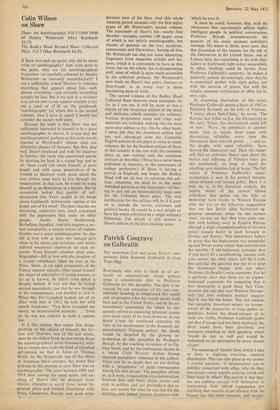Colin Wilson on Shaw
If Shaw was such an egoist, why did he never write an autobiography? And, even more to the point, why are his autobiographical fragments—so carefully collected by Stanley Weintraub—so curiously unsatisfactory? I am a sufficiently ardent Shavian to welcome everything that appears about him—well, almost everything—and certainly everything actually by him. But if my task as a reviewer is to advise SPECTATOR readers whether to lay out a total of £7.50 on the patchwork 'autobiography' (of which this is the second volume), then I have to admit I would not consider the money well spent.
Because the truth is that Shaw was not sufficiently interested in himself to be a good autobiographer or diarist. It is true that the autobiographical prefaces to his early novels (quoted in Weintraub's volume one), are delightful classics of humour. But they deal with Shaw's boyhood and with his relatives in Dublin—the uncle who committed suicide by shutting his head in a carpet bag, and so on. Shaw could talk about himself, at great length and with some penetration—if he wanted to illustrate some point about the way writers must learn to live through the imagination; in that case, he would be using himself as an illustration in a lecture. But he completely lacked that quality of self- absorption that Yeats caught in his image about Goldsmith 'deliberately sipping at the honey pot of his mind'. The great diarists are emotional, subjective men, much concerned with the impression they make on other people: Amid, Marie Bashkirtseff, Barbellion, Stendhal. And this requires a cer- tain immaturity, a certain failure of realism Goethe was a great autobiographer; he also fell in love with at least two teenage girls when in his sixties and seventies, and nearly suffered emotional shipwreck on each oc- casion. Yeats himself—another great auto- biographer—fell in love with the daughter of a former sweetheart when he was in his fifties. Shaw, as art aged monument of the Fabian summer schools, often found himself the object of admiration of young women; as far as is known, he didn't even pinch a shapely behind. It was not that he lacked normal masculinity; just that he saw through to the consequences, and decided to skip it. When Mrs Pat Campbell backed out of an affair with him in 1913, he told her with superb frankness: 'You have wounded my vanity, an inconceivable audacity . . .' Even so, he was too realistic to hold it against her.
It is this realism that makes him disap- pointing on the subject of himself; the Six- teen Self Sketches, one of his last works, must be the dullest book he ever wrote. Even the autobiographical novel Immaturity, writ- ten at twenty-two, lacks the kind of absorbed self-interest we find in Joyce or Thomas Wolfe. So Mr Weintraub, one of the ablest of American Shaw scholars, has pretty thin pickings in this attempt to turn Shaw into an autobiographer. The years between 1898 and 1914 were among the most active and ex- citing of Shaw's life; he emerged from relative obscurity to world fame, wrote his greatest plays and formed friendships with
Wells, Chesterton, Russell, and most other I., eminent men of his time. And this whole amazing period occupies only the first eighty pages of Mr Weintraub's second volume.
The remainder of Shaw's life—nearly four decades—occupies another 140 pages, most of which is not strictly autobiography, but chunks of polemic on the war, socialism, communism and Darwinism. Among all this, Mr Weintraub has dug out some interesting fragments from magazine articles and lec- tures, which it is convenient to have in this form; but on the whole, this is disappointing stuff, most of which is quite easily -accessible in the collected prefaces. Mr Weintraub's own book on Shaw's war years, Journey to Heartbreak, is in every way a more fascinating piece of work.
The second volume of the Bodley Head Collected Shaw deserves some comment. As far as I can see, it will be more or less a reprint of the American edition of the plays and prefaces, which occupies six volumes. Various programme notes and other such materials are included, making this the most up-to-date edition so far. On the other hand, I never felt that the American edition had any real advantage over the Constable English edition of the plays in twice as many volumes. By far the handiest edition of Shaw in this country is the one with the complete plays in one volume and the complete prefaces in the other. (These have never been published in America, to the annoyance of college professors.) If Shaw is having a revival in England, one hopes the Bodley Head will see its way to reissuing this edi- tion; otherwise, we shall be in the same wretched position as the Americans—of hav- ing to pay out an inconveniently large sum for the Collected Shaw plays. The real justification for this edition will be if it goes on to include the novels, criticisms and political books. (It would be a real delight to have the music criticisms in a single volume.) Otherwise, I'm afraid, it will remain a library edition in the least exciting sense.


































 Previous page
Previous page